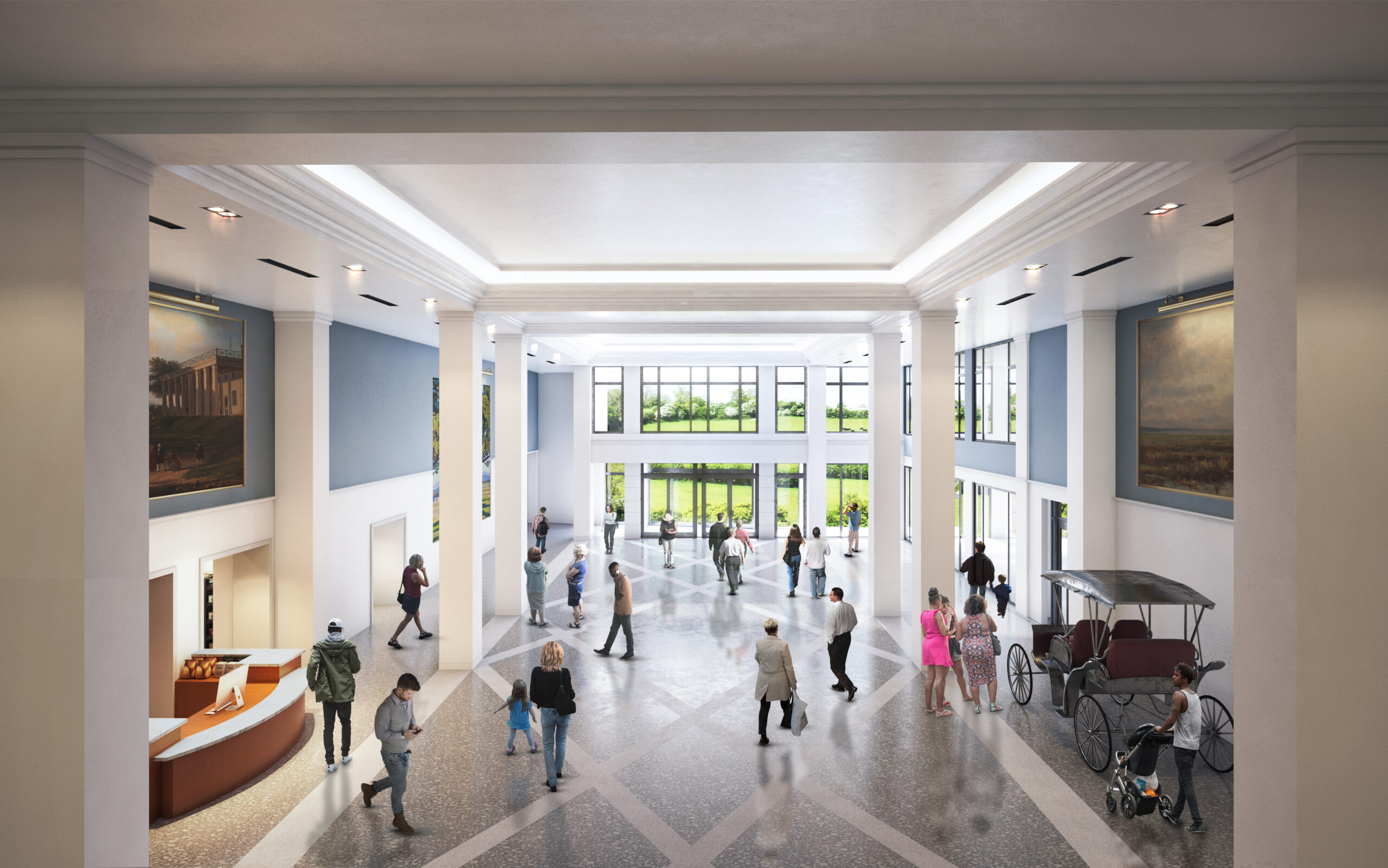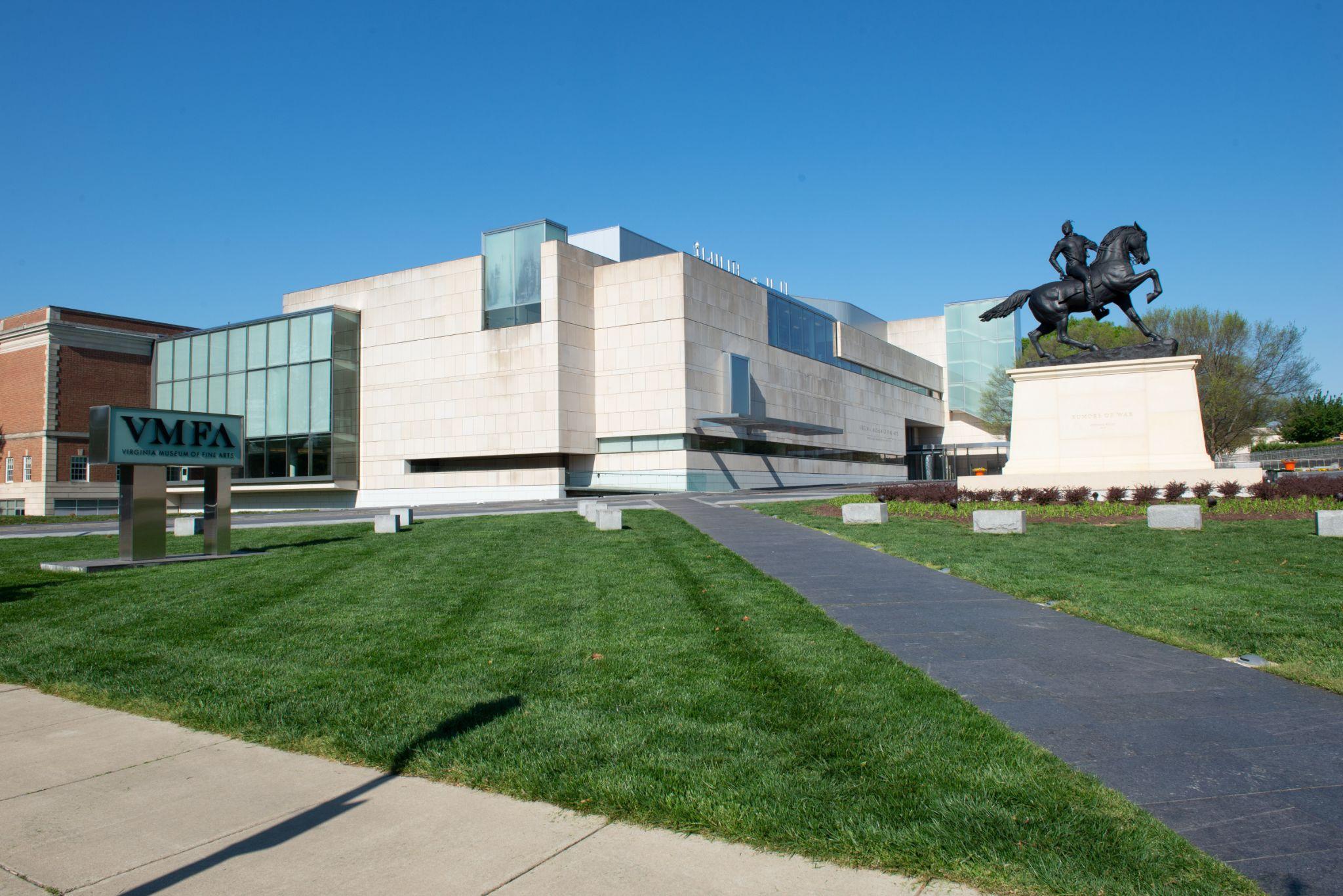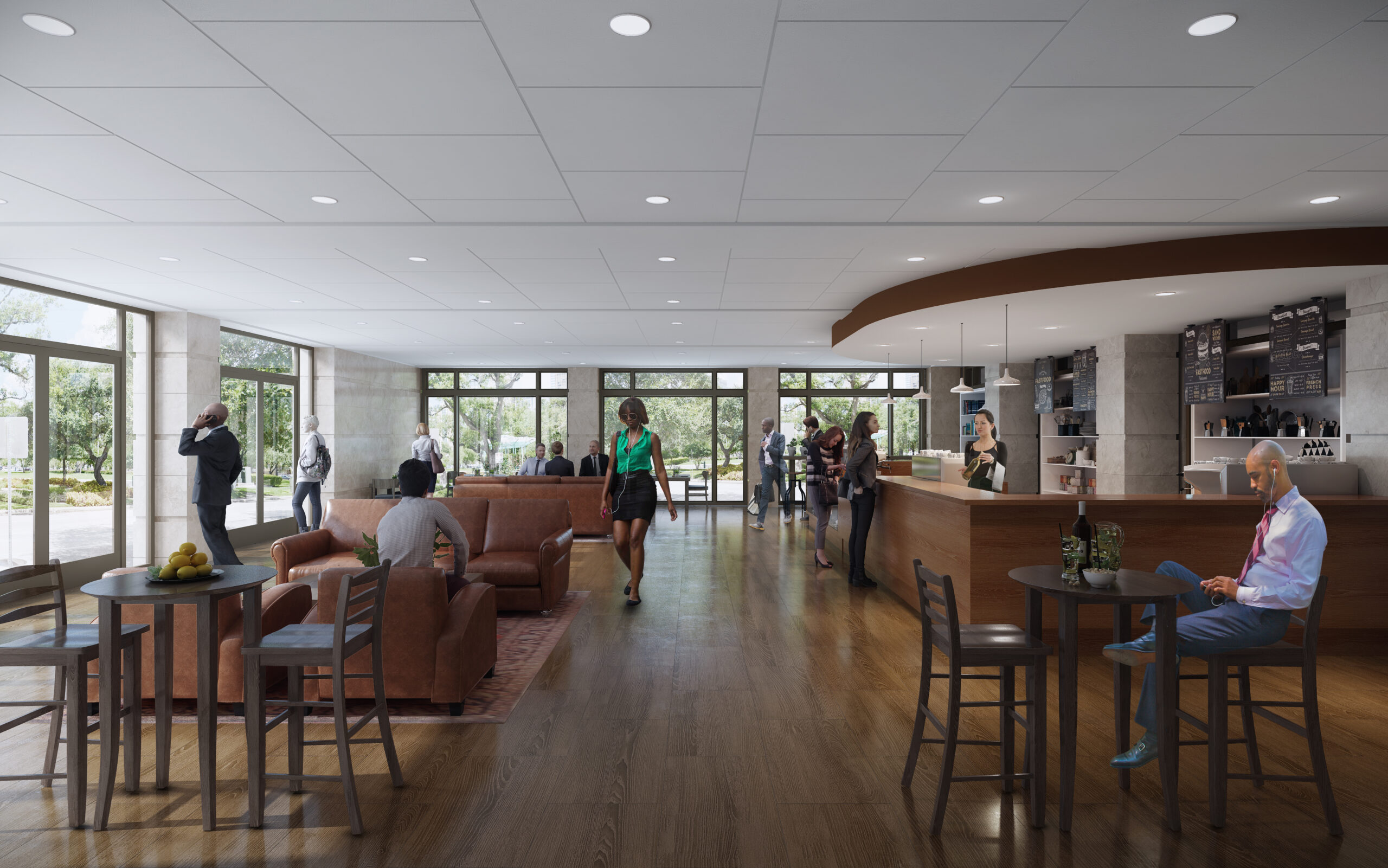
The Virginia Museum of History & Culture’s $30 million renovation will include a redesigned entrance, shown here. (Image courtesy of Glave & Holmes Architecture)
The Virginia Museum of Fine Arts and its neighbor the Virginia Museum of History & Culture are each at different stages of their own multimillion-dollar expansion and renovation projects.
The Virginia Museum of History & Culture expects to reopen to the public in mid-May after a $30 million renovation. The VMFA is in the early stages of a $190 million expansion and renovation slated to wrap up in 2026.
The museums’ leaders framed ongoing construction as new chapters for their institutions, not only as investments in core exhibition spaces but also further expansion into events and programming.
The expectation is the projects will drive substantial increases in visitation in the coming years.
Virginia Museum of History & Culture
The renovation project will expand the Virginia Museum of History & Culture exhibition space by 50 percent, add a new orientation theater, a new events terrace, meeting rooms and a revamped gift shop, President and CEO Jamie Bosket said.
“Really every way you look at it, it is us upping our game as a visitation attraction,” Bosket said.
A cafe is also among the new features that will open at the Virginia Museum of History & Culture as part of its project, and would be a first for the museum. The cafe will serve coffee, sandwiches, craft beer and wine. It’ll have seating for 36 people.
“It has two big goals in mind: One, to be an amenity for the overall experience of the museum, but also to be an amenity to the community,” Bosket said of the cafe.
The museum’s five-year goal is to attract 200,000 visitors annually after the renovation project. The museum had 110,000 visitors in 2019.
The project, which began in fall of 2020, adds 10,000 square feet to the second floor of the 250,000-square-foot museum. Also included in the project are a new research library and improvements to outdoor spaces.
The renovation is a continuation of the museum’s shift toward a more public-facing institution, which started in 2018 when the facility’s name also changed from the Virginia Historical Society. Pre-2018, visitation was about 50,000 people annually.
“It’s an expansion, a renovation, a reimagining and it’s also a shift from a staid research organization to one still focused on research but also focused on welcoming people and reflecting the stories of all Virginians,” Bosket said. “We best fulfill that mission by reaching the most people possible. We felt it was important to expand the ways we can tell the story to be more vibrant, more active and more compelling and provide more reasons for people to visit this place.”
The museum will, when it reopens, charge non-members to park in its surface parking lot, which will expand by 50 percent as part of the project.
Bosket said the parking fee, along with the cafe and new meeting spaces that will be created as part of the renovation, are all efforts to drive more revenue to the museum’s operations.
The museum reported total revenue of $8.8 million in fiscal year 2019, down from total revenue of $10 million the previous fiscal year. Its total expenses in FY19 were $9.2 million compared to $8.7 million the prior fiscal year.
The project will include creation of a two-story entry hall to the museum. The space is born of three rooms built decades apart from one another to create a single uniform space.
“We envision this being a beautiful arrival space to the museum,” Bosket said. “It’s a place for people to gather and get oriented but also a place for functions.”
The museum raised the project funding primarily through individual donations during a capital campaign that also added $15 million to the museum’s endowment.
Glave & Holmes Architecture is the project architect. The general contractor is Whiting-Turner Contracting Co.
The museum has hired or is in the process of hiring about 15 new or largely revamped roles as part of the project. Those new roles range from managers overseeing new or combined departments as well as cafe staff.
The museum has about 80 employees currently.
The museum closed temporarily in January for the final stage of the project, though it has been open in a limited fashion during most of the construction.

The Virginia Museum of Fine Arts at 200 N. Arthur Ashe Blvd. is in the early stages of a $190 million expansion and renovation that will add a new 170,000-square-foot wing. (Photo courtesy of VMFA)
Expansion at the VMFA
As its neighbor is in the home stretch of its update, the VMFA is kicking off a substantial expansion and renovation of its own.
Director and CEO Alex Nyerges said the museum outgrew its 2010 expansion, a $150 million project that added the James W. and Frances G. McGlothlin Wing to the museum.
“For all intents and purposes we had outgrown the wing by the time the planning started on the wing in the early 2000s,” Nyerges said, noting that the museum increased its collection 30 percent between 2005 and 2022.
To remedy that, the state-supported VMFA is planning a $190 million expansion project. The project, which is in its early stages, will add a new 170,000-square-foot wing and renovate another 45,000 square feet of existing facilities to create new exhibition and storage spaces.
Museum visitation has averaged more than 579,000 annually over the past five years, not factoring visitation in the pandemic years of 2020 and 2021, Nyerges said.
The museum expects to break ground on the project in summer 2023, and construction is expected to finish in spring 2026.
In June, the museum announced architecture firm SmithGroup would design the project. The museum plans to have a construction manager selected by this summer.
Among the new construction is a 12,000-square-foot special exhibition gallery, which will be the same size as the existing lower-level special exhibition space, where the museum holds its ticketed, rotating exhibitions. With two special exhibition spaces in play at a time, Nyerges said, the museum would make itself a more compelling place for visitors.
“Special exhibitions are the engine that drives the train,” Nyerges said. “Imagine that as a counterpoint to the Terracotta Army (special exhibition). We’re able to expand the scope and breadth of what we can offer.”
The new wing will also display the museum’s growing collections of 21st Century, African, American and Native American art. The wing will also include a new special events space that will be able to accommodate 500 people for sit-down events as well as more storage among other features.
The renovation project is planned to include the new Frank Raysor Center for the Study of Works on Paper, a center featuring a larger dedicated suite for the photography collection, study rooms, conservation and framing studios.
The Leslie Cheek Theater will get a wider stage and renovations intended to allow expanded programming and a larger photography gallery.
The VMFA announced in March that it had received a $57 million gift from patrons James W. and Frances Gibson McGlothlin to go toward the project. It also announced in March it had received a “significant” donation of an undisclosed amount from Eda Hofstead Cabaniss, a museum trustee, that will also go toward the project. The General Assembly approved $112 million toward the project in 2020.
The museum has about 240 salaried employees and about 320 hourly employees as of mid-April. Just how much the workforce will expand in tandem with the project is still being determined, but new hires are expected across the organization from special events and art handlers to accounting and education.
The VMFA and VMFA Foundation reported combined total revenue of $43.1 million and total expenditures of $43.1 million in fiscal year 2019. The prior fiscal year, the VMFA and VMFA Foundation reported combined revenue of $42.2 million and total expenditures of $41.8 million.

The Virginia Museum of History & Culture’s $30 million renovation will include a redesigned entrance, shown here. (Image courtesy of Glave & Holmes Architecture)
The Virginia Museum of Fine Arts and its neighbor the Virginia Museum of History & Culture are each at different stages of their own multimillion-dollar expansion and renovation projects.
The Virginia Museum of History & Culture expects to reopen to the public in mid-May after a $30 million renovation. The VMFA is in the early stages of a $190 million expansion and renovation slated to wrap up in 2026.
The museums’ leaders framed ongoing construction as new chapters for their institutions, not only as investments in core exhibition spaces but also further expansion into events and programming.
The expectation is the projects will drive substantial increases in visitation in the coming years.
Virginia Museum of History & Culture
The renovation project will expand the Virginia Museum of History & Culture exhibition space by 50 percent, add a new orientation theater, a new events terrace, meeting rooms and a revamped gift shop, President and CEO Jamie Bosket said.
“Really every way you look at it, it is us upping our game as a visitation attraction,” Bosket said.
A cafe is also among the new features that will open at the Virginia Museum of History & Culture as part of its project, and would be a first for the museum. The cafe will serve coffee, sandwiches, craft beer and wine. It’ll have seating for 36 people.
“It has two big goals in mind: One, to be an amenity for the overall experience of the museum, but also to be an amenity to the community,” Bosket said of the cafe.
The museum’s five-year goal is to attract 200,000 visitors annually after the renovation project. The museum had 110,000 visitors in 2019.
The project, which began in fall of 2020, adds 10,000 square feet to the second floor of the 250,000-square-foot museum. Also included in the project are a new research library and improvements to outdoor spaces.
The renovation is a continuation of the museum’s shift toward a more public-facing institution, which started in 2018 when the facility’s name also changed from the Virginia Historical Society. Pre-2018, visitation was about 50,000 people annually.
“It’s an expansion, a renovation, a reimagining and it’s also a shift from a staid research organization to one still focused on research but also focused on welcoming people and reflecting the stories of all Virginians,” Bosket said. “We best fulfill that mission by reaching the most people possible. We felt it was important to expand the ways we can tell the story to be more vibrant, more active and more compelling and provide more reasons for people to visit this place.”
The museum will, when it reopens, charge non-members to park in its surface parking lot, which will expand by 50 percent as part of the project.
Bosket said the parking fee, along with the cafe and new meeting spaces that will be created as part of the renovation, are all efforts to drive more revenue to the museum’s operations.
The museum reported total revenue of $8.8 million in fiscal year 2019, down from total revenue of $10 million the previous fiscal year. Its total expenses in FY19 were $9.2 million compared to $8.7 million the prior fiscal year.
The project will include creation of a two-story entry hall to the museum. The space is born of three rooms built decades apart from one another to create a single uniform space.
“We envision this being a beautiful arrival space to the museum,” Bosket said. “It’s a place for people to gather and get oriented but also a place for functions.”
The museum raised the project funding primarily through individual donations during a capital campaign that also added $15 million to the museum’s endowment.
Glave & Holmes Architecture is the project architect. The general contractor is Whiting-Turner Contracting Co.
The museum has hired or is in the process of hiring about 15 new or largely revamped roles as part of the project. Those new roles range from managers overseeing new or combined departments as well as cafe staff.
The museum has about 80 employees currently.
The museum closed temporarily in January for the final stage of the project, though it has been open in a limited fashion during most of the construction.

The Virginia Museum of Fine Arts at 200 N. Arthur Ashe Blvd. is in the early stages of a $190 million expansion and renovation that will add a new 170,000-square-foot wing. (Photo courtesy of VMFA)
Expansion at the VMFA
As its neighbor is in the home stretch of its update, the VMFA is kicking off a substantial expansion and renovation of its own.
Director and CEO Alex Nyerges said the museum outgrew its 2010 expansion, a $150 million project that added the James W. and Frances G. McGlothlin Wing to the museum.
“For all intents and purposes we had outgrown the wing by the time the planning started on the wing in the early 2000s,” Nyerges said, noting that the museum increased its collection 30 percent between 2005 and 2022.
To remedy that, the state-supported VMFA is planning a $190 million expansion project. The project, which is in its early stages, will add a new 170,000-square-foot wing and renovate another 45,000 square feet of existing facilities to create new exhibition and storage spaces.
Museum visitation has averaged more than 579,000 annually over the past five years, not factoring visitation in the pandemic years of 2020 and 2021, Nyerges said.
The museum expects to break ground on the project in summer 2023, and construction is expected to finish in spring 2026.
In June, the museum announced architecture firm SmithGroup would design the project. The museum plans to have a construction manager selected by this summer.
Among the new construction is a 12,000-square-foot special exhibition gallery, which will be the same size as the existing lower-level special exhibition space, where the museum holds its ticketed, rotating exhibitions. With two special exhibition spaces in play at a time, Nyerges said, the museum would make itself a more compelling place for visitors.
“Special exhibitions are the engine that drives the train,” Nyerges said. “Imagine that as a counterpoint to the Terracotta Army (special exhibition). We’re able to expand the scope and breadth of what we can offer.”
The new wing will also display the museum’s growing collections of 21st Century, African, American and Native American art. The wing will also include a new special events space that will be able to accommodate 500 people for sit-down events as well as more storage among other features.
The renovation project is planned to include the new Frank Raysor Center for the Study of Works on Paper, a center featuring a larger dedicated suite for the photography collection, study rooms, conservation and framing studios.
The Leslie Cheek Theater will get a wider stage and renovations intended to allow expanded programming and a larger photography gallery.
The VMFA announced in March that it had received a $57 million gift from patrons James W. and Frances Gibson McGlothlin to go toward the project. It also announced in March it had received a “significant” donation of an undisclosed amount from Eda Hofstead Cabaniss, a museum trustee, that will also go toward the project. The General Assembly approved $112 million toward the project in 2020.
The museum has about 240 salaried employees and about 320 hourly employees as of mid-April. Just how much the workforce will expand in tandem with the project is still being determined, but new hires are expected across the organization from special events and art handlers to accounting and education.
The VMFA and VMFA Foundation reported combined total revenue of $43.1 million and total expenditures of $43.1 million in fiscal year 2019. The prior fiscal year, the VMFA and VMFA Foundation reported combined revenue of $42.2 million and total expenditures of $41.8 million.






State of the art museums like these are essential for our civilization. I am a 20 year member of VMFA and though I don’t have a brush stroke in my bones, I marvel at the works on the walls there. The latest “Whistler to Cassat” is incredible. Go today.
I am so excited to get back into the VMHC and see all the work that they’ve done. I’ve been bragging about them to every relocation candidate I’ve brought in this year, and I am very ready to actually bring folks through the exhibits in person.
I wonder if the museum is planning on any evening events similar to what the VMFA has done with their After Dark series and Happy Hours. If [Cheap Beverages] + [Art] = SUCCESS, who’s to say the same equation wouldn’t work for Virginia history?
And yet their employees are some of the lowest paid in their fields nationally. Do better, y’all.
I have turned down jobs at this musem due to the wages being so hidously low. On top of that they wanted you to work there for a $11.00 dollars a hour and wanted you to pay them $80 dollars a month for parking while working there.
As long as the VMFA doesn’t destroy the very popular greenspace behind the museum….